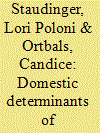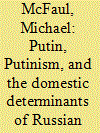| Srl | Item |
| 1 |
ID:
130999


|
|
|
|
|
| Publication |
2014.
|
| Summary/Abstract |
We examine the degree to which national political setting, namely domestic political opportunity structures, influences the transnational activities of women's groups in the United Kingdom, France, and Germany. The literature suggests that social groups are more likely to choose international activity when national institutions provide fewer opportunities for domestic activity (Keck and Sikkink 1998; della Porta and Tarrow 2005). Using data about women's groups' activity from a content analysis of news wires from 1980 to 2008, we conclude that women's groups act in the domestic sphere significantly more than they act in the international arena-even when acting on transnational issues-and that groups choose international action when domestic opportunities are less hospitable to group action. Thus, we argue that the domestic sphere continues to be a major influence on social movement activity even as globalization and transnationalism increase.
|
|
|
|
|
|
|
|
|
|
|
|
|
|
|
|
| 2 |
ID:
099105


|
|
|
|
|
| Publication |
2010.
|
| Summary/Abstract |
Why do some countries protect minority shareholders from rent-seeking by corporate insiders while others do not? To the extent that there has been convergence toward shareholder-friendly laws, what factors have shaped that convergence? We explore this question by examining the worldwide diffusion of insider trading laws through a series of event history analyses. We argue that variation in the adoption and enforcement in insider trading laws can be best explained by the interaction of rising international competitive pressures to attract investment capital through investor-friendly laws and electoral laws that make governments more or less vulnerable to economic voting. We find that governments are more likely to adopt and enforce insider trading laws when they face reelection under electoral laws that make them relatively vulnerable to economic voting and when they face international competitive pressures. Moreover, we find that the impact of domestic political institutions declines in significance as international competitive pressures increase, and vice-versa.
|
|
|
|
|
|
|
|
|
|
|
|
|
|
|
|
| 3 |
ID:
175079


|
|
|
|
|
| Summary/Abstract |
Why did Russia's relations with the West shift from cooperation a few decades ago to a new era of confrontation today? Some explanations focus narrowly on changes in the balance of power in the international system, or trace historic parallels and cultural continuities in Russian international behavior. For a complete understanding of Russian foreign policy today, individuals, ideas, and institutions—President Vladimir Putin, Putinism, and autocracy—must be added to the analysis. An examination of three cases of recent Russian intervention (in Ukraine in 2014, Syria in 2015, and the United States in 2016) illuminates the causal influence of these domestic determinants in the making of Russian foreign policy.
|
|
|
|
|
|
|
|
|
|
|
|
|
|
|
|